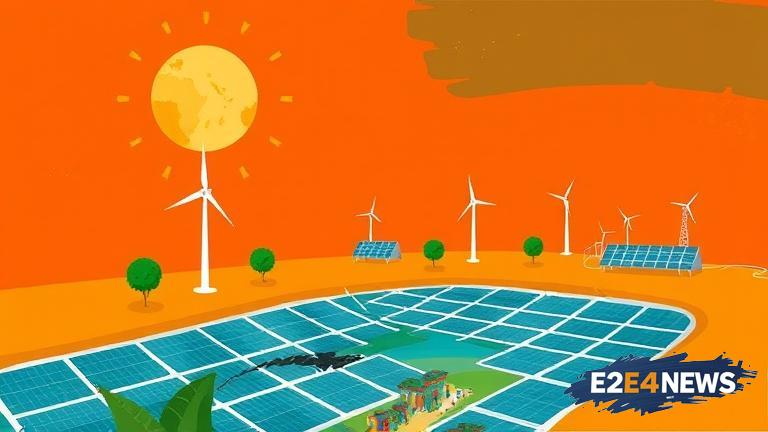The African continent is witnessing a significant shift towards renewable energy, driven by the need to address the pressing issues of energy access, climate change, and sustainable development. With many countries still struggling to provide reliable and affordable electricity to their citizens, renewable energy has emerged as a viable solution. Solar and wind power are leading the charge, with countries like South Africa, Egypt, and Morocco investing heavily in these sectors. The African Renewable Energy Initiative, launched in 2015, aims to achieve at least 300 GW of renewable energy capacity by 2030. This ambitious target is expected to create new economic opportunities, stimulate growth, and improve energy security. Moreover, the adoption of renewable energy can help reduce greenhouse gas emissions, contributing to a cleaner and healthier environment. The use of renewable energy can also enhance energy independence, reducing reliance on imported fossil fuels and promoting regional cooperation. In addition, the development of renewable energy infrastructure can create new job opportunities, stimulate local economies, and improve the overall quality of life. Many African countries are already making significant strides in the renewable energy sector, with Kenya, for example, aiming to generate 70% of its electricity from renewable sources by 2030. Similarly, Ghana has set a target of 10% renewable energy in its energy mix by 2030. The private sector is also playing a crucial role in driving the growth of renewable energy in Africa, with companies like Vestas and Siemens Gamesa investing in wind and solar projects across the continent. Furthermore, international organizations like the African Development Bank and the International Renewable Energy Agency are providing critical support to African countries, helping them to develop and implement effective renewable energy policies. The benefits of renewable energy are numerous, ranging from reduced energy costs to improved air quality and enhanced energy security. As the demand for energy continues to grow, African countries must prioritize the development of renewable energy sources to ensure a sustainable and prosperous future. The transition to renewable energy will require significant investment, but the long-term benefits far outweigh the costs. In conclusion, Africa’s renewable energy revolution is gaining momentum, driven by the need to address the continent’s energy challenges and promote sustainable development. With the right policies, investments, and partnerships, Africa can emerge as a global leader in the renewable energy sector, creating a brighter future for its citizens and contributing to a more sustainable world. The growth of renewable energy in Africa is expected to have a positive impact on the environment, reducing carbon emissions and promoting eco-friendly practices. Moreover, the development of renewable energy infrastructure can help to stimulate economic growth, create new job opportunities, and improve the overall quality of life. As the world continues to grapple with the challenges of climate change, Africa’s renewable energy revolution offers a beacon of hope, demonstrating the potential for sustainable development and a cleaner, healthier environment. The future of renewable energy in Africa looks promising, with many countries committed to achieving their renewable energy targets and promoting sustainable development. In the coming years, we can expect to see significant growth in the renewable energy sector, driven by government policies, private sector investment, and international cooperation. Ultimately, the success of Africa’s renewable energy revolution will depend on the ability of governments, businesses, and civil society to work together, promoting a sustainable and prosperous future for all.
